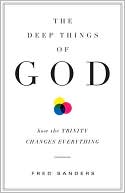Monday, August 30, 2010
Chan, Driscoll, and Harris
Excellent interview of Francis Chan by Mark Driscoll and Josh Harris. If you are not familiar with story, recently Francis Chan resigned from a megachurch, Cornerstone Church in Simi Valley, CA, for reasons that even after this interview seem a little hazy. What I find most intriguing is the discussion on poverty vs. wealth and simplicity vs. complexity.
Tuesday, August 10, 2010
False Assumption #4: What's Grace?
Grace is not a very popular concept. Not sure that it is ever been. Being nice, courteous, thoughtful, fair are all quite popular. Not grace. By grace I mean, as one song puts it, the ability to “make beauty out of ugly things.” The world assumes the ugly gets treated as ugly. So if ugly you are, then better do your best to put on a pretty face. But real grace looks at the vilest evil and doesn’t even blink but suffers to transform it into good. Real grace hurts so that the offender doesn’t have to. Real grace gives selfless love when justice demands punishment. Such grace, as I say, is not very popular.
What’s wrong with the human race? A popular Christian answer to that question would be pride. And no doubt there is tremendous Biblical as well as practical evidence for the thought. But I’ve begun to wonder if there is a deeper issue than pride. An interesting story was told by David Brainerd, the 18th century missionary to New England Native Americans. Brainerd said that in his preaching to the Indians, conviction over sin seemed to be felt most by the Indians when he was presenting the grace and excellencies of Christ. Now Brainerd was mentored by the likes of Jonathan Edwards and his crowd, and if you know anything of those “New Lights,” as they were called, you know they could bring the thunder when it came to sin. Reading a few entries of Brainerd’s journal will leave the most smug of us deeply convicted over our own godlessness, for Brainerd was a man fully acquainted (and some would say morbidly acquainted) with his own depravity. In other words, Brainerd’s sermons on sin were not soft and light. Yet it was not discoursing sin that produced conviction. Rather, says Brainerd, conviction occurred as he proclaimed the grace of Christ to suffer for that sin.
Too good to be true. Brainerd’s testimony seems to suggest there’s more than pride at work in the human heart. Perhaps, we can’t admit our messed upness because we don’t believe, we can’t believe that there is actually a grace in the world that would look on our ugliness and make it beautiful. That there is grace that doesn’t treat us as we deserve, but instead lavishes gifts on us that we could never earn. That there is a grace that doesn’t even blink at what we ourselves can’t look upon, and then takes the hurt to make the evil into good. Such a grace is just too good to be true.
Grace is a message the world has never heard. It’s a message that they almost never see. They don’t believe it exists. They’ve never even considered the possibility that it could. That’s why the grace of Christ has the power to do what they law (God’s standard of good) could never do. The law can bring conviction of sin, but not like grace. The law points out our flaws, but grace shines hope onto them. The law fills us with guilt over our transgressions. Grace makes us sing about them.
What’s wrong with the human race? A popular Christian answer to that question would be pride. And no doubt there is tremendous Biblical as well as practical evidence for the thought. But I’ve begun to wonder if there is a deeper issue than pride. An interesting story was told by David Brainerd, the 18th century missionary to New England Native Americans. Brainerd said that in his preaching to the Indians, conviction over sin seemed to be felt most by the Indians when he was presenting the grace and excellencies of Christ. Now Brainerd was mentored by the likes of Jonathan Edwards and his crowd, and if you know anything of those “New Lights,” as they were called, you know they could bring the thunder when it came to sin. Reading a few entries of Brainerd’s journal will leave the most smug of us deeply convicted over our own godlessness, for Brainerd was a man fully acquainted (and some would say morbidly acquainted) with his own depravity. In other words, Brainerd’s sermons on sin were not soft and light. Yet it was not discoursing sin that produced conviction. Rather, says Brainerd, conviction occurred as he proclaimed the grace of Christ to suffer for that sin.
Too good to be true. Brainerd’s testimony seems to suggest there’s more than pride at work in the human heart. Perhaps, we can’t admit our messed upness because we don’t believe, we can’t believe that there is actually a grace in the world that would look on our ugliness and make it beautiful. That there is grace that doesn’t treat us as we deserve, but instead lavishes gifts on us that we could never earn. That there is a grace that doesn’t even blink at what we ourselves can’t look upon, and then takes the hurt to make the evil into good. Such a grace is just too good to be true.
Grace is a message the world has never heard. It’s a message that they almost never see. They don’t believe it exists. They’ve never even considered the possibility that it could. That’s why the grace of Christ has the power to do what they law (God’s standard of good) could never do. The law can bring conviction of sin, but not like grace. The law points out our flaws, but grace shines hope onto them. The law fills us with guilt over our transgressions. Grace makes us sing about them.
“Amazing grace, how sweet the soundChristians have long thought that step #1 in conversion is understanding sin, and thus the need of evangelists to lead with the law. But perhaps step #1 is understanding grace, so that those living in the fog of unbelief can feel the freedom to come into the light.
that saved a wretch like me.”
Subscribe to:
Posts (Atom)








